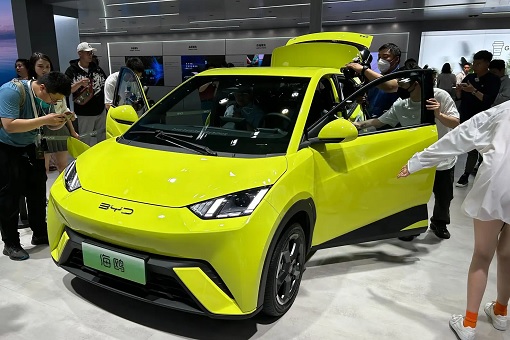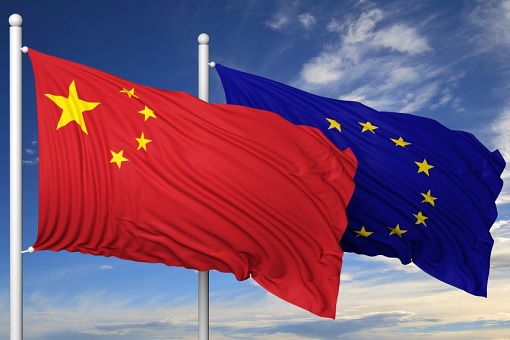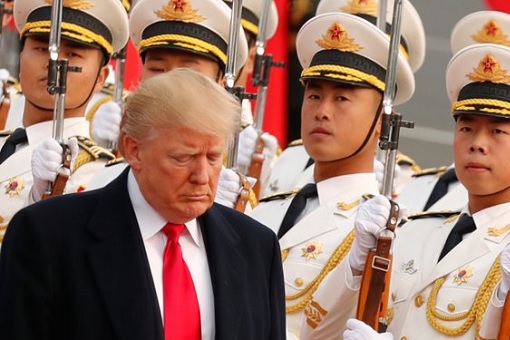Germany, the European Union’s biggest economy and major car producer, opposed tariffs on Chinese-built electric vehicles (EVs) for obvious reasons. Home to BMW, Volkswagen and Mercedes-Benz, the German automaker will be severely hit with similar tariffs if China retaliates against European auto industry. But the company was fighting a losing battle against its own politicians.
The Biden administration is raising tariffs on Chinese EVs to 100% from the current 25% – virtually blocking all Chinese EV imports. So, just like how the EU was pressured to ban Chinese telecommunication giant Huawei (because the U.S. was lagging behind China’s 5G technology), it again has to obediently follow Washington’s instruction to also stop the imports of Chinese electric vehicles.
But unlike banning Huawei, Europe does not want to slap 100% tariffs on Chinese EVs because it still wants affordable electric cars from abroad to achieve their goals of cutting greenhouse gas emissions by 55% by 2030. Therefore, the EU has decided that effective from October 30, 2024, tariffs on Chinese-built electric vehicles will be increased to as much as 45.3% from existing 10% for the next 5 years.

The duties differ depending on the maker – 17% for BYD, 18.8% for Geely and 35.3% for state-owned SAIC. Other EV manufacturers in China, including Volkswagen and BMW, would be subject to a 20.7% duty. However, the tariff rate is much lower for American automaker Tesla – just 7.8%. Clearly, the tariffs were designed to discriminate and punish the Chinese cars.
The European Commission, which oversees EU trade policy, has claimed that tariffs are required to counter so-called unfair subsidies all along the chain of production, from cheap land for factories from local governments to below-market supplies of lithium and batteries from state-owned enterprises to tax breaks and below-interest financing from state-controlled banks.
Crucially, Chinese-built electric cars jumped from 3.9% of the EV market in 2020 to 25% by September 2023. The EU says China’s spare production capacity of 3 million EVs per year is twice the size of the EU market. The rapid growth in market share has sparked fears that Chinese cars will eventually threaten the EU’s ability to produce its own green technology.

So, just like how the U.S. bans Huawei due to its inability to catch up in 5G technology, the EU is trying to block Chinese EVs due to its inability to compete in battery technology. The jobs of 2.5 million workers are also at risk in the auto industry and 10.3 million more people whose jobs depend indirectly on EV production. Solar panels from China have already wiped out European producers, something that EU doesn’t want to see repeated with their car industry.
It’s not hard to understand why the EU is panicking. BYD’s Seal U Comfort model sells for the equivalent of €21,769 (US$23,370) in China but €41,990 (US$45,078) in Europe. Despite that, five of BYD’s six models would still earn a profit in Europe even with a 30% tariff. The base model of BYD’s compact Seagull, due to arrive in Europe next year, sells for only US$10,000 in China.
The European automakers simply cannot compete with the Chinese brands as their prices are typically 20% below those of EU-made models. However, the decision to impose tariffs has split EU members such as France and Germany. While Germany and Hungary were among 5 members voted against the tariffs, 10 members – including France and Italy – voted in favour, and 12 abstained.

Even before the official decision to impose the tariffs was announced, Volkswagen reveals plans to shut at least three factories on home soil for the first time in its 87-year history, laying off tens of thousands of staff and shrink its remaining plants as part of a major overhaul to revamp its business and cut costs. This has sent shivers down the spine of roughly 300,000 Volkswagen staff in Germany alone.
For those lucky enough to keep their jobs, Volkswagen plans to cut salaries by at least 10% and freeze pay in both 2025 and 2026. Thomas Schaefer, who heads the Volkswagen brand division, said German factories were not productive enough and were operating 25-50% above targeted costs, meaning some sites were twice as expensive compared to the competition.
It was already bad that Europe, and Germany and Volkswagen for that matter, are facing severe pressure from high energy and labour costs, stiff Asian competition, weakening demand in Europe and China and a slower-than-expected electric transition. It becomes worse when the EU is now starting an “economic war” with China with the new tariffs.

The fact that only 10 out of its 27 members had voted to support the import taxes suggest that the decision was not based on majority (a majority 15 members is required to vote against the tariffs to block it). China’s Commerce Ministry called the decision to impose tariffs “unfair” and “unreasonable”, sparking fears among industry groups outside the car sector that they could face retaliatory tariffs from China.
In what appears to be a pre-emptive measure to avoid major retaliations, the European Union has apparently sent envoys to Beijing for negotiations regarding alternative to tariffs on Chinese EVs. While the effects of the tariffs would take some time to kick in, China has already begun its retaliations against the European Union.
Beijing has responded by launching its own anti-dumping investigations into European pork and brandy. The EU is the world’s largest exporter of pork and pork by-products, most of which are exported to China. Countries like Spain, the Netherlands, Denmark, Germany and Belgium would be the hardest hit by Chinese retaliation in a likely tariffs on pork imports from Europe.

China has also imposed taxes on imports of European brandy in a move that France has complained is retaliation against tariffs on Chinese EVs. French brandy producers said the duties, which will hit mega brands like Hennessy and Remy Martin, would be “catastrophic” for the industry. But Beijing accused European brandy producers of hurting Chinese producers by dumping brandy at unfairly low prices in the Chinese market.
China’s Ministry of Commerce said that brandy importers would temporarily be required to post deposits of up to 39% on the wholesale value of shipments to China. French Trade Minister Sophie Primas complains that the Chinese retaliation was “unacceptable” and a “total contradiction” of international trade rules, saying that France would work with the European Union to take action at the WTO.
France accounts for 99% of brandy exported to China, and French cognac lobby group BNIC said – “The French authorities cannot abandon us and leave us alone to deal with Chinese retaliation that has nothing to do with us”. Stock prices of Luxury firm LVMH, which produces Hennessy, and Remy Cointreau, which makes Remy Martin, plunged as the tariffs could translate into a 20% price increase for consumers.

Stepping up the pressure on Europe’s agriculture industry, China’s Ministry of Commerce has opened an anti-dumping investigation into dairy products imported from the EU. The counterattack involves fresh cheese, curdled milk, blue cheese, milk and cream. If Beijing slaps surtaxes on these products, it would be disastrous to EU member states that exported €1.7 billion (US$1.85 billion) worth of dairy products to China in 2023.
Ireland – the biggest exporter of dairy products to China, totalling over €410 million in 2023 – will be the most vulnerable. Other top EU countries that export dairy products to China are France, Italy, Denmark, Netherlands and Spain. Obviously, instead of declaring a war with the entire 27-nation bloc, China’s strategy is retaliating against individual member states.
Using the carrot and stick approach, Beijing has offered economic incentives, such as increased investment and market access, to countries (such as Hungary) that are “friendly” to Chinese EVs. In July 2024, Slovak media reported that Chinese car manufacturer SAIC was eyeing Slovakia and Czechia as potential locations for its EU-based plant.

As of October 2024, there are three Chinese battery plants in Germany, an EV plant in Poland, two EV plants and two battery plants in Hungary and an EV plant in Spain. But on the same day the EU tariffs were enforced, the Chinese Ministry of Commerce has told local car manufacturers to pause investment in countries that had voted in favour of the tariffs.
The targeted punishment would be bad news to the ten members of the EU, especially France and Italy. SAIC plans to open a parts centre in France before the end of 2025, whilst Italy has spoken with several companies looking to attract investment, including Chery and Dongfeng Motor. Now, those Chinese investments would go elsewhere.
BYD made the right decision to build a plant in Hungary, which voted against the tariffs. The Chinese EV giant has also been considering relocating its European headquarters from the Netherlands to Hungary due to cost concerns. With the new order from Beijing, BYD can now proceed in full swing with investments in Hungary. The Chinese government’s decision was not done hastily though.

Regardless who will become the next U.S. president, the anti-Chinese policies will continue. If Donald Trump wins, which appears to be the case, the EU might even be forced to increase its tariffs further on Chinese EVs as Trump has made it clear that he would take steps to prevent Chinese carmakers from selling vehicles in the U.S. as part of his plan to save the American auto industry.
Still, even if tariffs erase some or all of the profits on some EVs, it’s possible that Chinese EV makers “would be willing to forgo profits in the short-term and sell at a loss in order to gain market share in the world’s second biggest EV market”. Europe could walk into a disaster as an unpredictable Trump administration may result into higher oil prices – pushing up inflation at a time when the EU also engage in trade war with China.
Other Articles That May Interest You …
- Europe’s Tariffs On China’s EV Backfires – Volkswagen Closing Factories Before Even Trade War Begins
- From Kingdom Of Bicycles To Automaker Giant – Why Western Automakers Are In Trouble As China Shows Them The Exit
- BYD Beats Tesla Again – How The U.S. Carmaker Lost Its Crown As World’s Top Electric Vehicles Manufacturer
- Sodium-Ion Battery – How China Supercharge Rechargeable Batteries To Dominate The Next Big Technology
- Electric Car As Cheap As $11,000 – How China Beats The U.S. In Electric Vehicles & Leaves Global Brands In The Dust
- Volvo Will Sell Only Electric Cars By 2030 – And You Can Only Buy It Online
- Learn From China – Mahathir Has To Dismantle Discrimination & Racist Economic Policy First
- If Proton Has The Quality Of Volkswagen Or Toyota, People Will Not Dump The National Cars
- Third National Car, The Unfinished Business – Why Mahathir Should Wake Up & Stop Hallucinating
- China Geely Introduces Meritocracy – But Handicapped Proton “Bumiputeras” Aren’t Happy
- 80% Cheaper To Take Robo-Taxi – The Next Car You Buy Could Be Your Last

|
|
November 2nd, 2024 by financetwitter
|


|

|

|

|

|

|




























Comments
Add your comment now.
Leave a Reply